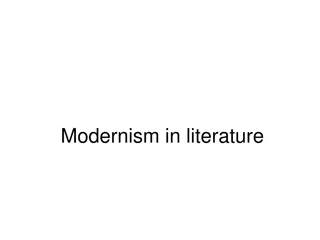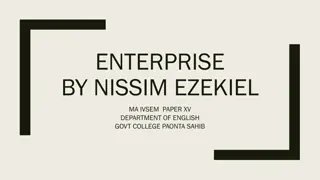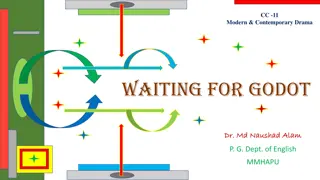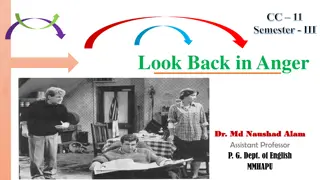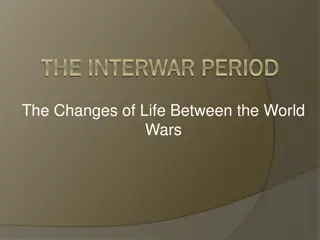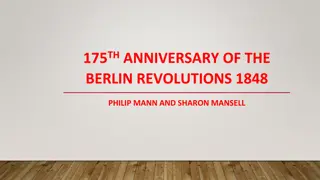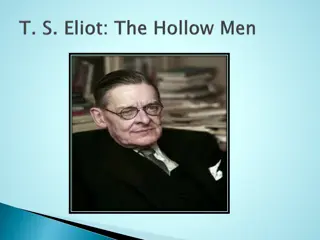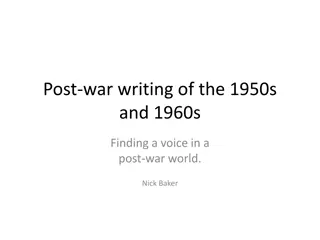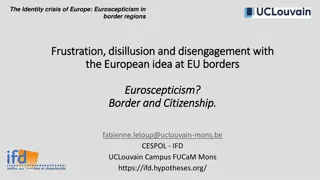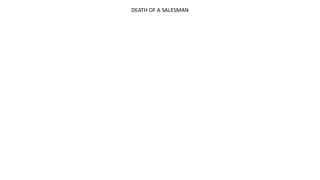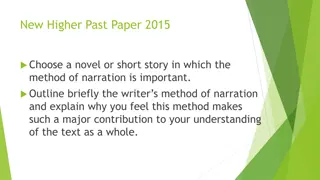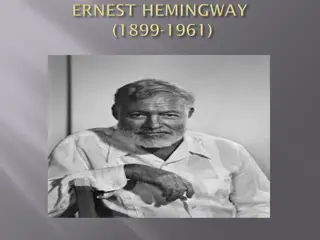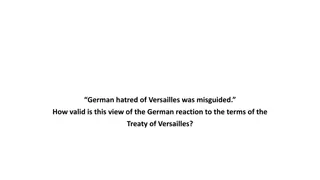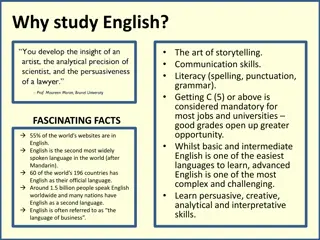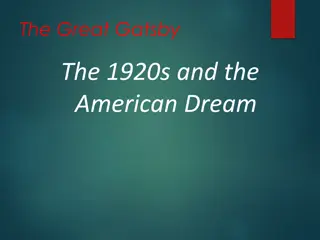Exploring Modernism in Literature and Beyond
Modernism in literature emerged as a groundbreaking international movement in the early 20th century, challenging traditional norms and exploring new forms of expression. This movement, characterized by experimentation and a rejection of absolute knowledge, extended beyond literature into various fi
0 views • 17 slides
Analysis of "Enterprise" by Nissim Ezekiel
Enterprise" is a poem by Nissim Ezekiel that explores the journey of a group on a pilgrimage, reflecting on themes of idealism, reality, pride, and the value of the journey itself. The group faces challenges and disillusionment, ultimately highlighting the fragility of human aspirations and the comp
0 views • 10 slides
Understanding Samuel Beckett's Waiting for Godot: A Modernist Masterpiece
Samuel Beckett, a prominent modernist writer, crafted the groundbreaking play "Waiting for Godot" as a tragicomedy in a theater of the absurd. Set in a vague time and place, the play reflects the post-World War II disillusionment and existential themes. Beckett's experimental approach challenges tra
1 views • 16 slides
Exploring John Osborne's Look Back in Anger: A Modern Classic Drama
Look Back in Anger, a seminal play by John Osborne, delves into themes of alienation and identity in post-World War II England. The play's protagonist, Jimmy Porter, embodies the disillusionment and rage of the era, challenging societal norms and class struggles. Osborne's work revolutionized Englis
0 views • 9 slides
Disillusionment in "Blood" by Keith Aitchison
The short story "Blood" by Keith Aitchison delves into themes of ownership, patriotism, and disillusionment as seen through the interactions of the characters. The arrival of Timothy Maguire sparks a struggle for heritage ownership, leading to conflicts within the family. Through Timothy's influence
0 views • 10 slides
Life Between the Wars: A Cultural Transformation
Disillusionment, a lost generation of writers reflecting post-war despair, existentialist contemplation, and avant-garde artistic rebellion marked the interwar period. Artists like Salvador Dali and Pablo Picasso reshaped visual expression, while musicians like Duke Ellington led the shift away from
0 views • 13 slides
The Berlin Revolutions of 1848: A Historic Perspective
The Berlin Revolutions of 1848 were part of a series of widespread uprisings across Europe, driven by a mix of liberal and working-class goals. The revolutions aimed to challenge the existing autocratic political structure in the German Confederation and the Austrian Empire. Despite initial hopes fo
1 views • 14 slides
Reflections of the Hollow Men
The Hollow Men is a poignant poem reflecting on emptiness, futility, and lost souls in a desolate world. Through vivid imagery and haunting verses, it explores themes of death, disillusionment, and the human condition. The poem delves into the sense of alienation and spiritual bankruptcy, evoking a
0 views • 12 slides
Post-War Reflections: Voices and Identities of the 1950s and 1960s
Exploring the themes of post-war literature from the 1950s and 1960s, this analysis delves into the tensions, crises, and identities shaped by the era. Writers of the time grapple with finding a voice that reflects the uncertainty of a changing world order, encompassing disillusionment, anger, and i
0 views • 16 slides
Euroscepticism in Border Regions: The Identity Crisis of Europe
Euroscepticism in border regions reflects frustration, disillusionment, and disengagement with the European idea at the borders of the EU. The identity crisis of Europe is showcased through sentiments of dissatisfaction and detachment towards the EU, as evidenced in various border regions. This phen
0 views • 29 slides
Analysis of "Death of a Salesman" Character Dynamics and Themes
Set in post-WWII America, "Death of a Salesman" explores the inner turmoil and tragic fate of Willy Loman, a character trapped between the American dream and societal injustices. Willy's delusions and conflicting desires drive him to suicide, reflecting the impact of capitalism on familial relations
0 views • 10 slides
The Life and Influence of John Calvin and the Calvinist Church
Jean Calvin, known as John Calvin, was a major Christian reformer from France who had a significant impact on the Calvinist, Presbyterian, and Reformed Churches. Born in Noyon, France, Calvin's disillusionment with the Roman Catholic Church led him to Geneva, Switzerland, where he furthered his teac
0 views • 11 slides
Understanding Holden’s Narration in “The Catcher in the Rye”
Explore Holden’s unique narrative style in J.D. Salinger’s novel “The Catcher in the Rye” by analyzing his use of stock phrases, digressions, lies, and fantasies. Understand how these elements underscore Holden’s alienation, disillusionment, and critical perspective, shaping the reader’s
0 views • 8 slides
Exploring Themes and Characters in James Joyce's Araby
Delve into James Joyce's short story "Araby" to unravel themes of darkness, isolation, and naivety, as reflected through the protagonist's character and the symbolic setting. The narrator's journey unfolds against a backdrop of longing, disillusionment, and epiphany, offering a poignant reflection o
0 views • 42 slides
America in the 1920s: Post-WWI Adjustments and Challenges
America faced significant adjustments and challenges in the immediate post-World War I period of 1919-1921. The country grappled with issues like disillusionment with foreign affairs leading to isolationism, economic recession due to returning soldiers and reduced demand for war supplies, the rise o
0 views • 12 slides
Foundations of Baha'i Governance and Unity
Profound teachings of Baha'u'llah have ignited hearts, awakened souls, and invited individuals to seek oneness. The Baha'i Faith embodies a distinctive administrative model without clergy, emphasizing communal elections, non-partisanship, and consultative decision-making. This innovative approach fo
0 views • 13 slides
Hemingway: A Literary Portrait of the Lost Generation
Hemingway, an expatriate writer in Paris, epitomized the Lost Generation with his raw and poignant portrayal of post-war disillusionment and trauma. Through his powerful use of language and tight, economical style, he captured the harsh realities of life and the futility of war. Hemingway's works re
0 views • 21 slides
The United States Imperialism in East Asia: The Filipino Rebellion
The United States' decision to keep the Philippines as a territory sparked a rebellion led by Filipino nationalist leader Emilio Aguinaldo, who initially believed the US was an ally in the fight for independence. However, disillusionment led to an insurrection against US rule, with Filipino insurgen
0 views • 16 slides
German Reaction to Treaty of Versailles: Misguided Hatred or Justified Resentment?
German resentment towards the Treaty of Versailles, seen by some as misguided, stemmed from divergent expectations, harsh territorial losses, and a perception of unfair treatment. While the treaty was not as severe as initially anticipated, it triggered a widespread sense of disillusionment and nati
0 views • 18 slides
Understanding the Fertile Ground of Cultural Influences on Religious Movements
Cultures provide fertile soil for diverse religious movements due to various factors such as secularism, existential uncertainties, disillusionment with leaders, and a deep human longing for transcendence. Other contributing factors include breakdown of traditional social structures, moral relativis
0 views • 13 slides
Exploring the Significance of Studying English and the American Dream through Art and Literature
Studying English is essential for honing communication skills, literacy, and securing opportunities in various fields. Meanwhile, the American Dream represents an ethos of achieving prosperity and success through hard work and equal opportunity. This concept has been explored in various forms of art
0 views • 6 slides
The 1920s: A Decade of Transition and Contrasts
The 1920s in America were a time of significant change and contradictions, marked by the aftermath of World War I, economic boom, social unrest, and cultural shifts. The era saw booming economy, rise of organized crime, implementation of Prohibition, and societal changes in morals and attitudes. Des
0 views • 34 slides
